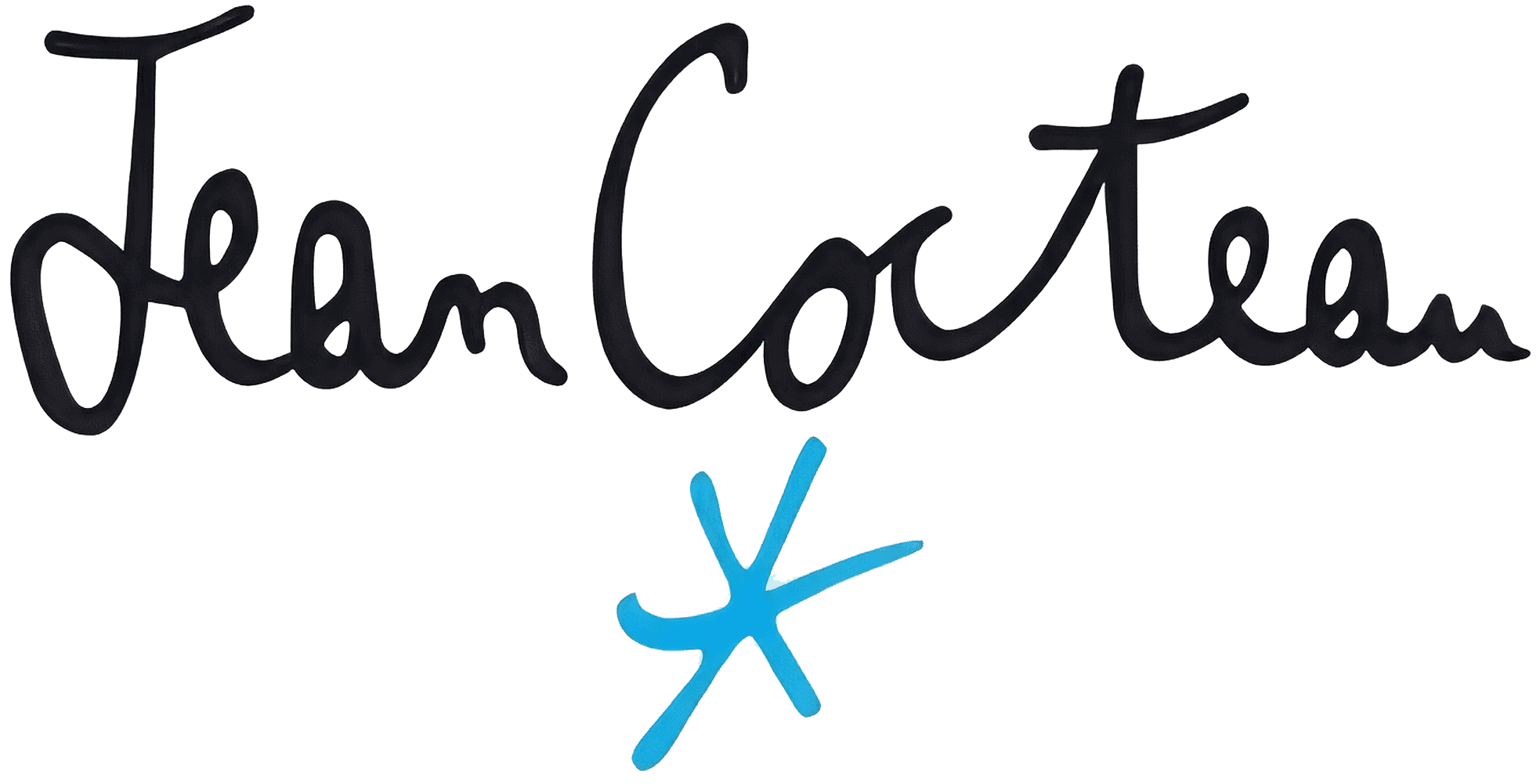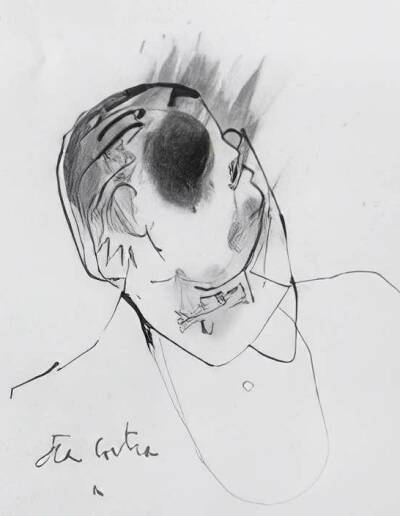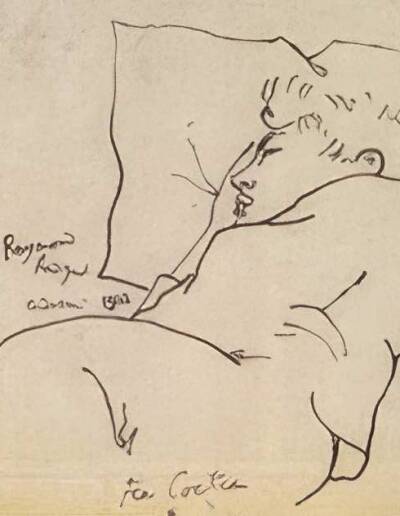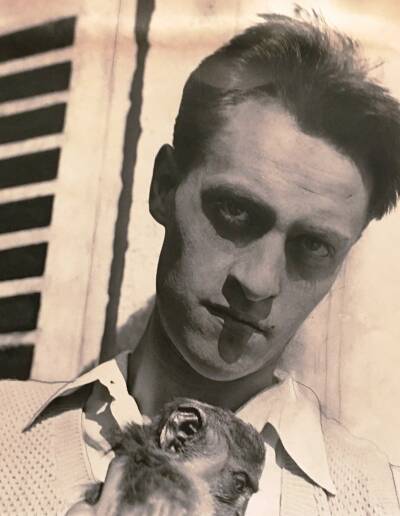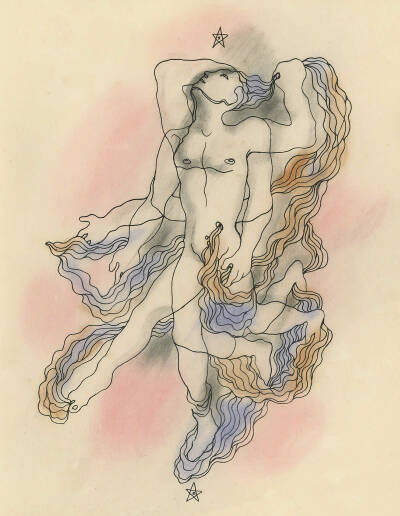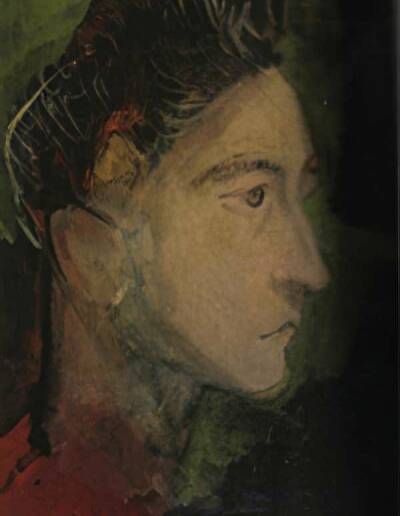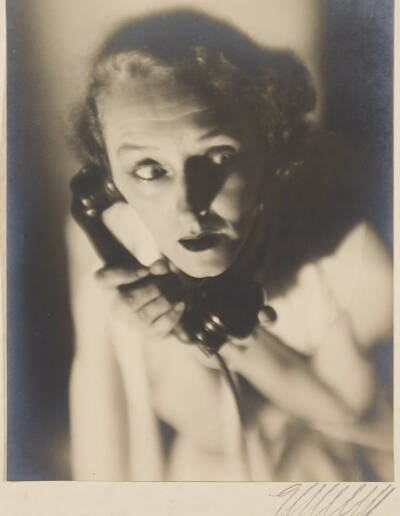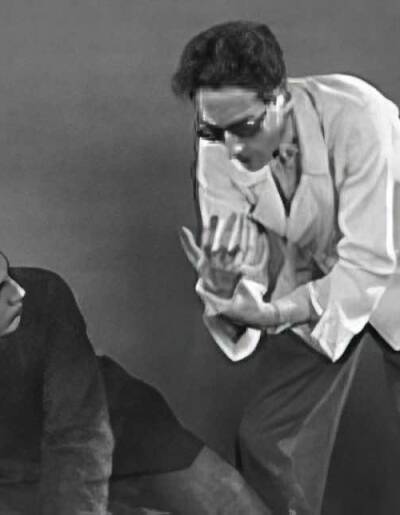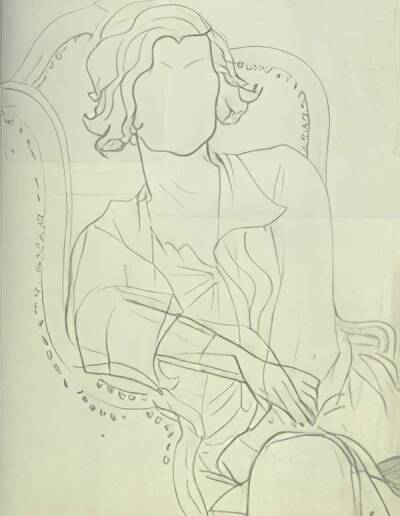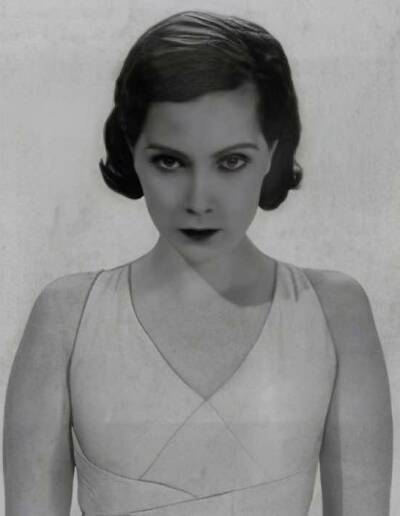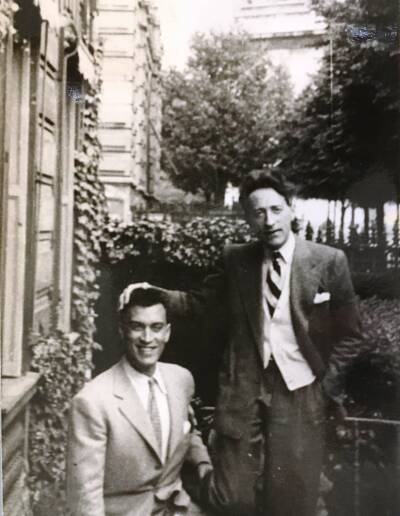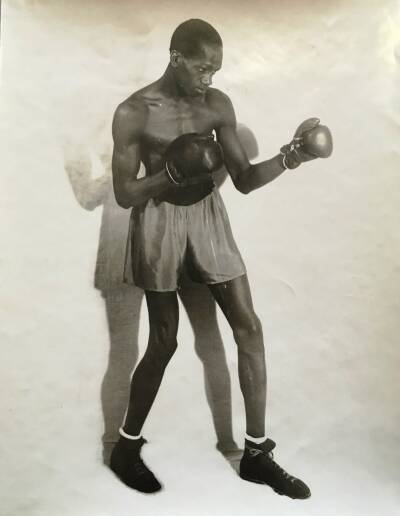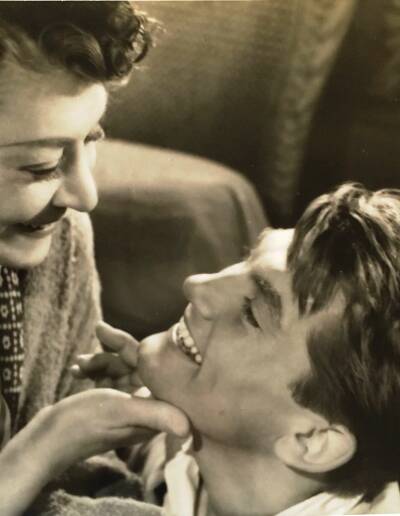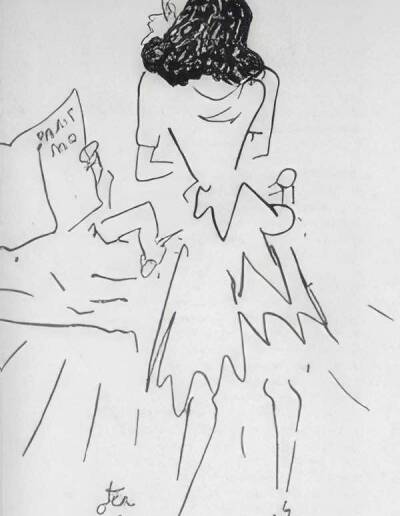In February, Cocteau spends a few days alone in Chantilly, at the Hôtel du Grand-Condé. In March, Le Diable au corps (Devil in the Flesh) is published. In April, Cocteau travels to London and Oxford with Radiguet. In the Autumn, Plein-chant, la Rose de François, and Picasso are released. In October, Le Grand écart (The Great Divide), and Thomas l’Imposteur (Thomas the Impostor) are published – a week apart. In late November, Radiguet takes up residence in the Hotel Foyot. On December 12th, for want of adequate medical supervision, he dies of typhoid. Devastated, Cocteau does not attend the funeral.
In January, Diaghilev, Auric and Poulenc take a distraught Cocteau to Monte-Carlo. They urge him to find solace in opium. He works on plans for the ballet Le Train bleu. In February, in Paris, he meets Maurice Sachs for the first time. He works on preparations for Romeo & Juliet which is set to open at the Théâtre de la Cigale on June 2nd. Not only does he direct the play, he also plays Mercutio. Sachs too, appears in the cast. Le Train bleu has its premiere on June 20th with music by Darius Milhaud. Cocteau attends a performance of the ballet in London in December. At the end of June, a collection of drawings dedicated to Picasso goes on sale in bookstores. In July, Auric takes Cocteau, who is desperately seeking spiritual peace, to the home of the Maritains. The same month, on a visit to the home of Picasso, he discovers the name Heurtebise in a lift. It spurs him to write the poem L’Ange Heurtebise (The Angel Heurtbise). He leaves for Villefranche and the villa Le Calme where he will remain with Georges Auric and Marcelle Garros until November. He visits Picasso, the Hugos, and the Croissets. He also learns to drive.
Poésie 1916-1923 is published in January. In February, Cocteau meets Jean Bourgoint and Bourgoint’s sister Jeanne. Their room will be his inspiration for the sets of the Enfants Terribles (Children of the Game). From March 15th to April 15th, at the Maritains’ urging he seeks treatment for opium addiction at the Clinique des Thermes Urbains in Rue Chateaubriand. He draws prolifically and writes poetry that will eventually be included in Opera. He convalescences in Versailles until May 11th. Cri écrit (Written Cries) is published. He spends from August to October at the Hotel Welcome in Villefranche; Georges Hugnet introduces him to Christian Bérard. A period of intense creativity ensues; Lettre à Maritain, Orpheus, Opéra, Oedipus Rex. Prière mutilée (Maimed Prayer) and l’Ange Heurtebise (The Angel Heurtbise) are all published in August. Cocteau starts writing to Jean Desbordes. The first volume of Maritain’s "Le Roseau d’or" (The Golden Reed) on which Cocteau collaborated arrives in bookstores. At Christmas, Abbé Mugnier hears Cocteau’s confession; Cocteau attends Midnight Mass and celebrates Christmas Eve at the Maritains.
Having arrived at the Hotel Welcome in Villefranche on December 31st, Cocteau spends the entire year there making only brief trips to Paris. He writes Oedipus Rex for Stravinsky who, from mid-January works on the music. Disputes arise with the surrealists. Orpheus has its première on June 17th at the Théâtre des Arts. Cocteau spends the summer in Villefranche; Jean Desbordes, who has become a substitute for Radiguet, visits him. Le Rappel à l’ordre (The Call to Order), Romeo & Juliet and an album of drawings, Maison de santé (Nursing Home), are published. From December 10th to 28th, an exhibition of unusual objects and drawings entitled Poésie plastique (Sculpted poetry) is held at the Galerie des Quatre Chemins. Cocteau spends the end of December at the Hotel de la Madeleine on rue de Surène, probably with Jean Desbordes.
In January, Cocteau goes to Montpellier and meets Yves Belaval, a young student with whom he has been corresponding. On May 30th, Stravinsky conducts the première of Oedipus Rex. Cocteau spends the summer with Desbordes in Chantilly, then on the Côte d’Azur. Orpheus and Opéra are published. On December 7th, Cocteau gives a lecture at the Université des Annales, on the theme of Orpheus and Oedipus. On December 16th, the opera Pauvre matelot (The Poor Sailor), premières with music by Darius Milhaud. Cocteau completes La voix humaine (The Human Voice) and writes Le Livre blanc (The White Book). On December 28th, the opera Antigone, premieres at the Théâtre de la Monnaie in Brussels with music by Honegger.
In January, Cocteau goes to Montpellier and meets Yves Belaval, a young student with whom he has been corresponding. On May 30th, Stravinsky conducts the première of Oedipus Rex. Cocteau spends the summer with Desbordes in Chantilly, then on the Côte d’Azur. Orpheus and Opéra are published. On December 7th, Cocteau gives a lecture at the Université des Annales, on the theme of Orpheus and Oedipus. On December 16th, the opera Pauvre matelot (The Poor Sailor), premières with music by Darius Milhaud. Cocteau completes La voix humaine (The Human Voice) and writes Le Livre blanc (The White Book). On December 28th, the opera Antigone, premieres at the Théâtre de la Monnaie in Brussels with music by Honegger.
Cocteau, who finds himself in the same clinic as Raymond Roussel, remains there until April when Chanel stops paying for the treatment. He draws, begins Opium and writes Les Enfants terribles (Children of the Game) in eighteen days. He makes his first public appearance on March 19th for a reading of La Voix humaine (The Human Voice) at the Comédie-Française. In April, he takes up residence in a Hotel on the Rue Bonaparte. He spends May with Desbordes -first in Villefranche then in Roquebrune. On June 4th in Paris, he, Gaston Gallimard, René Crevel and Marie Laurencin are witnesses to the marriage of Jouhandeau and Caryathis. In July, Les Enfants terribles (Children of the Game) is published; it is received favourably by the critics. He spends August and September with Desbordes in Roquebrune: the atmosphere is tense and punctuated by disputes. Desbordes finally walks out on Cocteau. That autumn, in Paris, the poet lives at the Madeleine-Hôtel-Palace. He records the poems of Opéra on disc. On December 11th, he attends the tenth anniversary concert for the Group of Six at the Théâtre des Champs-Elysées. On December 25th, Jeanne Bourgoint commits suicide. As a result, Cocteau and Auric go to Hyères to stay with the Noailles. Cocteau explores the idea of making a cartoon to be financed by Charles de Noailles.
The dress rehearsal of La Voix humaine (The Human Voice) at the Comédie-Française provokes a hostile protest from Eluard. On April 15th, the filming of le Sang d’un poète (Blood of a Poet) gets underway. Shooting will continue until September. On June 4th, at the Théâtre Pigalle, Cantate is performed with music by Igor Markevitch and text by Cocteau. Cocteau spends August and September in Toulon with Desbordes and Bérard. There are numerous soirées at the Villa Blanche, home of the Bourdets. In December, Opium, journal d’une désintoxication (Opium, diary of a detoxification) appears in bookstores.
On May 1st, Cocteau publishes an article in the N.R.F. on Les Tragédiens, the novel by Desbordes published the previous February. He spends the summer in Toulon with Bérard and Desbordes. However, at the end of August he contracts typhoid and is forced to spend forty days in a clinic, after which he convalesces with the Bourdets at Villa Blanche. He returns to Paris on November 15th and starts smoking opium again.
On January 20th, le Sang d’un poète (Blood of a Poet) is screened at Vieux-Colombiers. Essai de critique indirecte (An Essay in Indirect Criticism) is published towards the end of April, followed by Morceaux choisis-Poèmes (Poems and Selected Pieces) in June. In the spring, at a screening of le Sang d’un poète (Blood of a Poet), he meets and subsequently has an affair with Natalie Paley (the niece of Tsar Alexander III, born in 1905). He leaves her in the Summer to join Desbordes in Saint-Mandrier. He completes La machine infernale (the Infernal Machine), a play he had started at the beginning of the year and which Jouvet opts to stage in December. He stays in touch with Natalie by letter. He reproaches her for aborting their child – something she will always deny. In the autumn, their relationship ends for good.
Marcel Khill, whom Cocteau meets during the summer of 1932, becomes Cocteau’s secretary. In November, the Fantôme de Marseille is published in the N.R.F. In December, Jean Desbordes leaves Cocteau definitively. The poet undergoes another bout of detox.
On March 26th, Soixante dessins pour Les Enfants terribles (Sixty Sketches for Children of the Game) is printed. The dress rehearsal for la Machine infernale (The Infernal Machine) takes place at the Comédie des Champs-Elysées on April 9th. Cocteau plays the Voice and introduces Marcel Khill into the cast. He spends the summer in Villars-sur-Ollon with Marie-Laure de Noailles. In the autumn, he sketches and completes a new play, Les Chevaliers de la Table ronde (The Knights of The Round Table). He often sees Ramuz. Mythologie, illustrated by De Chirico is published. He befriends Louise de Vilmorin and leaves Rue Vignon for the Madeleine-Palace Hotel in the Place de la Madeleine.
From January 19th to May 11th, "Portraits-souvenirs" is published in the Saturday edition of Le Figaro. The work will be issued in book form in January 1936. Cocteau spends the spring on the Côte d’Azur, first in Juan-les-Pins, then with Khill near Antibes; and finally, alone in Villefranche. He has difficulty working. In July, he sails with Khill aboard the Lancelot from Villefranche to Toulon for a story that will appear in Paris-Soir during August under the title "Rediscovering childhood". Back in Paris, he moves into the Hotel de Castille at 37 Rue Cambon. He spends the end of the year in Mas de Fourques at the home of Jean Hugo.
From March 29th to June 17th, in response to a project proposed by Paris-Soir publisher Jean Prouvost, Cocteau and Khill follow the example of Jules Verne’s hero and travel Around the World in 80 Days. A diary of their journey appears in Paris-Soir between August 1st and September 3rd and is published in book-form in early 1937 under the title Mon premier voyage (My First Voyage). Spurred on by Gide’s intervention, Cocteau and Aragon reconcile their differences. The poet spends Christmas at the Château de Briacé.
Cocteau finds the former world boxing champion Al Brown working as a musician in a cabaret. With the help of Chanel, Cocteau puts him through detox and brings him back to competitive boxing. March 2nd sees the start of "Articles de Paris" a joint project with Ce Soir. The column, which has no set theme, will run until June 1938. Whilst holding auditions for Oedipus Rex, Cocteau notices Jean Marais, a student of Raymond Rouleau. He ends up giving Marais a part in the chorus. The play’s dress rehearsal is held at the Théâtre Antoine on July 12th. On September 9th, at the Salle Wagram, Al Brown steps back into the ring and triumphs by knocking out his opponent in the first round. He regains the title of world champion on March 4th 1938, then, on the advice of Cocteau, retires from boxing. On October 14th, Les Chevaliers de la Table ronde (The Knights of the Round Table) opens at the Théâtre de l’œuvre. Jean Marais plays Galahad. In December, Cocteau and Marcel Khill travel to Marseille and northern Italy. The Académie Mallarmé is founded the same month: Cocteau is immediately called to its service.
Cocteau spends February in Montargis with Jean Marais. He writes Les Parents terribles (The Storm Within) in eight days. In April, Cocteau moves in with Jean Marais at 9 Place de la Madeleine. In July, he takes Marais to Toulon to stay with set designer Coula Roppa, an avid smoker of opium. Following a police raid at the home of their hostess, all three are charged with drug trafficking. Cocteau spends August at the Hotel du Soleil in Saint-Tropez then in Pramousquier. In September, he writes L’Incendie (The Fire) a poem dedicated to Marais. Les Parents terribles (The Storm Within) premieres at the Théâtre des Ambassadeurs on November 14th. A row with the Paris city council ensues and the latter tries to ban performances of the play.
On January 4th, Les Parents terribles (The Storm Within) moves from the Ambassadeurs to the Bouffes-Parisiens. Audiences give the play and its actors (Jean Marais and Yvonne de Bray) a rapturous reception. On February 10th, the Toulon drug affair goes to court and Cocteau is convicted and ordered to pay a heavy fine. In March, Enigme is published. On April 8th, the poet takes an ailing Jean Marais to Piquey. Whilst there, Cocteau writes La Fin du Potomak (The End of Potomak). In May, at the Hotel du Parc in Versailles, he writes La Machine à écrire (The Typewriter) in five days. When war is declared on September 3rd he is in Saint-Tropez with Jean Marais. While the latter is mobilised, Cocteau remains with Chanel at the Ritz then aboard the Scarabée where he writes Les Monstres sacrés (The Holy Monsters). At Christmas, he visits Jean Marais in his unit.
Les Monstres sacrés (Holy Monsters) premières at the Théâtre Michel on February 17th. The play then moves to the Bouffes-Parisiens. The show’s curtain-raiser is Le Bel indifferent (The Indifferent Lover) played by Edith Piaf. La fin du Potomak (End of Potomak) is published. Cocteau, who has been living in the Hotel du Beaujolais since his return to Paris, rents an apartment at 36 rue de Montpensier near the gardens of the Palais-Royal. It will be his last Paris address. In June, the Exodus leads him to Perpignan. He is joined there by a newly demobilised Jean Marais. Whilst there, Cocteau learns of the death of Marcel Khill. He returns to Paris in September. In December, he goes into detox for the last time.
Diaghilev, author of the famous apostrophe to Cocteau “Surprise me !” (drawing by Cocteau)
Diaghilev, author of the famous apostrophe to Cocteau “Surprise me !” (drawing by Cocteau)
Germaine Krull photo of Berthe Bovy in La Voix humaine
Germaine Krull photo of Berthe Bovy in La Voix humaine
Jean Marais and Yvonne de Bray in Les Parents Terribles 1948
Jean Marais and Yvonne de Bray in Les Parents Terribles 1948
